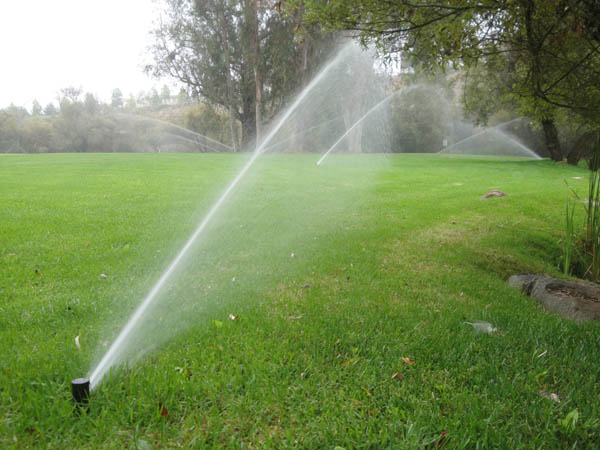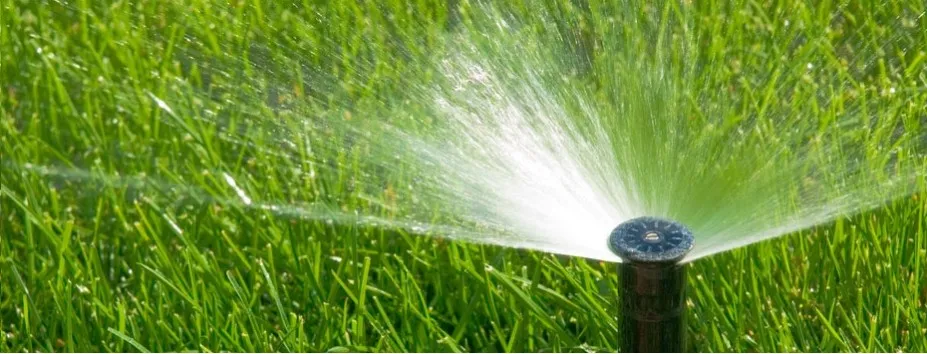Over the past month, our telephones have been heating up with clients calling with questions about watering their lawn this summer. Most often, the questions are how often and for how long should they run their sprinkler system with the rising temperature this summer. Although there are many variables that can change how often you need to water (clay or sandy soil, full sun or deep shade, etc.) The most important thing to do is to follow a couple simple rules of thumb to help ensure your lawn thrives in the summer heat.
Typical of North Florida we’ve changed from a comfortable spring to a fairly hot summer with head snapping speed. Not only do we feel that if we spend any amount of time outdoors, but those fast changes affect the soil moisture as well. The higher the temperature, the more moisture gets taken from the lawn by evaporation. Here are some quick tips to follow as we move into the 'dog days of summer':
Water at the Right Time
Watering in the early morning (or late evening in extreme drought) when temperatures are the lowest will reduce water loss through evaporation. This also happens to be when the wind speeds are lowest as well, which reduces wasted water onto driveways, sidewalks, and curbs and focuses the majority of the water into your Gainesville landscape. We recommend completing your irrigation cycles anytime before 7am, which allows the moisute to settle into the lawn and be soaked up for a few hours until the sun comes out to dry it off.
Set Your Run Times Based on the Season
To keep your Gainesville lawn healthy with just enough water, it is important to set your timer with a watering schedule that coincides with increasing or decreasing temperatures. For example, see the suggested table below for Rotor zones (If you don't know what a Rotor is, see the photo below):

For spray heads (see photo below to differentiate), use 60-75% of the time listed above due to the concentration of water they put out in their intended areas.
As mentioned in the opening paragraph, these recommendations are for your typical Gainesville, Florida Sprinkler system. Reduce time if you have a zone with more clay, shade, or drought-tolerant landscaping in that zone of your yard. Add time if you have sandier soil, full sun, or a more tender landscape. (For example, a commercial building that has parking lot islands surrounded by asphalt will need more time due to the raised temperature baking off the asphalt all day, creating quicker evaporation,
Water on the Right Days
Although it can be fustrating at times to obey the rules, the St. John's Water Management District only allows watering twice per week during the growing season. This can create a tension in extremely dry seasons between being water-concious and protecting your landscaping investment. By following the rules, but watering at the right times and for the right amount of time, you can preserve Florida's resources while also deepening your lawn's root system for a more vibrant landscape long-term.
However, there are a few exceptions to the rule to help you through a drought: If new sod or plants have been installed in the past 60 days, if you hand-water struggling areas of the landscape within the moring/eveing hours, if you're using reclaimed water (A good portion of Haile Plantation), or if it's for a vegetable garden. Keep these in mind if your landscape really beings to struggle in the next dry period.
Here's a link to an interactive map where you can type in your address to find out what days you should be running your system.
When Gainesville goes a couple days without rain and the temperatures hit the 90s or above, the rain water quickly disappears out of the top few inches of soil (which is where your grass-roots live.) If a lawn isn’t being watered properly it will start showing signs of heat stress and not be as green as you would think because it is drying out in the heat.
Bottom line - when you see that it is time to adjust your settings and make sure that your sprinkler system is operating correctly.
If you have questions or need help programming your irrigation timer or making sure your system is in top condition, give us a call at 352-378-5296 or email me at rusty@themasterslawncare.com. We offer affordable sprinkler system inspections and tune-ups that will guarantee adequate water coverage for your lawn. Our certified irrigation technicians can also install water-conserving nozzles, rain sensors, and improved rotors to ensure your GRU watering is as cost-efficient as possible.



